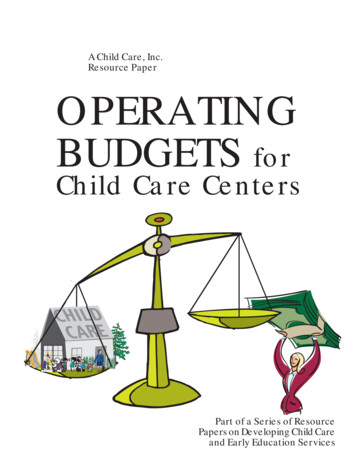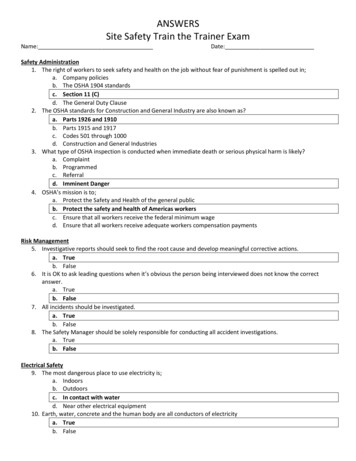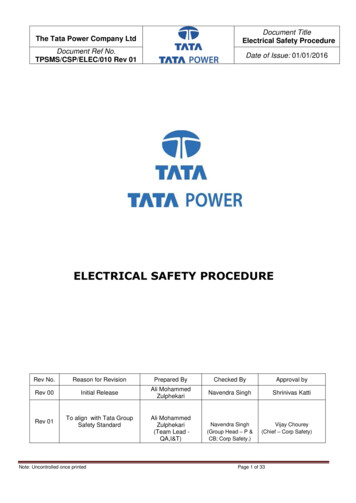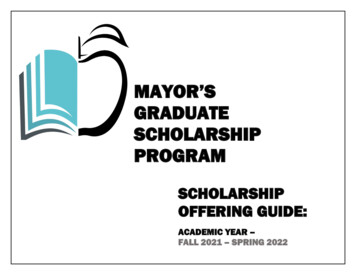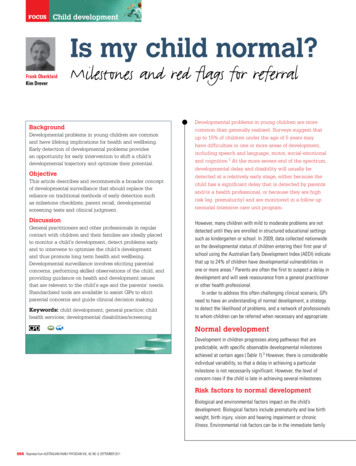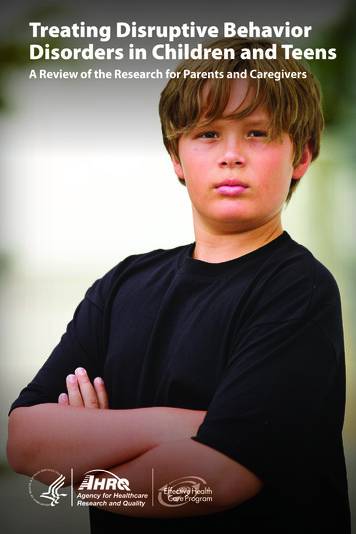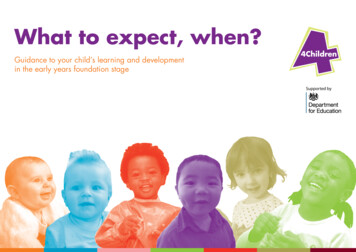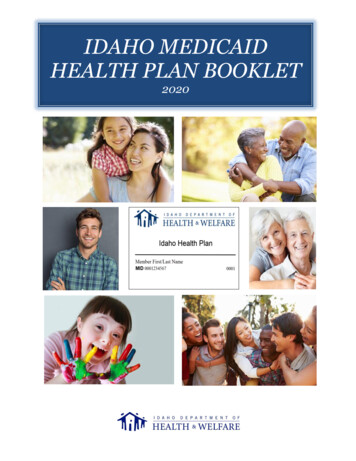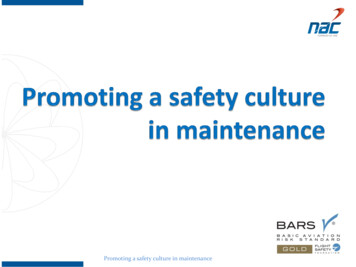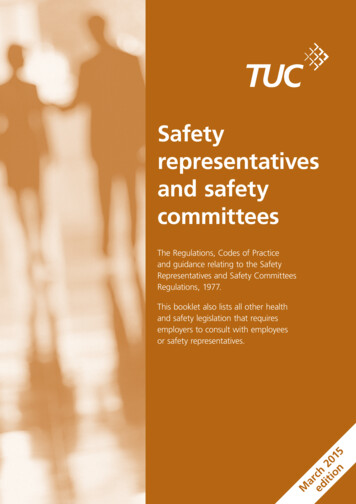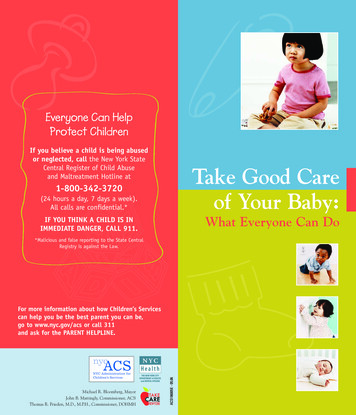
Transcription
Everyone Can HelpProtect ChildrenIf you believe a child is being abusedor neglected, call the New York StateCentral Register of Child Abuseand Maltreatment Hotline atTake Good Careof Your Baby:1-800-342-3720(24 hours a day, 7 days a week).All calls are confidential.*What Everyone Can DoIF YOU THINK A CHILD IS INIMMEDIATE DANGER, CALL 911.*Malicious and false reporting to the State CentralRegistry is against the Law.Michael R. Bloomberg, MayorJohn B. Mattingly, Commissioner, ACSThomas R. Frieden, M.D., M.P.H., Commissioner, DOHMHACS196005E - 05.06For more information about how Children’s Servicescan help you be the best parent you can be,go to www.nyc.gov/acs or call 311and ask for the PARENT HELPLINE.
You are the most important person in yourbaby’s life. That’s wonderful. It is also a hugeresponsibility:Besides loving your child, your job is to keep himor her healthy and safe.Don’t be afraid to ask for help from peopleyou trust.At the Administration for Children’s Services andthe Department of Health and Mental Hygiene,we want to help you to be the best parent youcan be. This booklet gives you ways to preventaccidents and protect your baby from harm.Nothing in it is complicated or costly.If you have any questions or concerns aboutparenting, visit www.nyc.gov/acs or call 311and ask for the Parent Helpline.ContentsContents1. Never shake your baby pg 2It is a crime to shake a babyWhen your baby cries2. Never leave your baby alone pg 4At homeOutside the houseIn case of an emergency3. It’s safest for baby to sleep alone pg 6Put your baby ‘back to sleep’To protect against SIDS4. Childproof your home pg 8A Message toImmigrant FamiliesAll of the services offered in this booklet areavailable to children and families regardless ofimmigration status, even if you are undocumented.We do not ask about immigration status or sharewhat you tell us with immigration authorities.Information about your status can be releasedonly rarely, such as in a criminal or terroristinvestigation.For non-emergency New York City information,including copies of this booklet and otherhelpful publications in English, Spanish, and otherlanguages, CALL 311 – Telephone interpretationis available in more than 170 languages.Administration for Children’s Services also hasinterpreters to help you communicate with us.Window guards prevent fallsOther ways to make your home safePrevent burns and fallsIf there’s a weapon in your home5. Protect against lead poisoning pg 126. Be the best parent you can be pg 14Get help for alcohol and drug abuseQuit smokingGet help for depressionA home without violence7. Choose your caregiver carefully: pg 16Think twice, then think againA good babysitterSafe and nurturing childcareBefore enrolling your child
1Never ShakeYour BabyNo matter how angry or frustrated you feelwhen your baby or toddler cries – and nomatter how much he or she cries – nevershake your baby or toddler.Shaking can cause bleeding in the brain thatcan injure or even kill a child. It takes only afew seconds of shaking to seriously hurt ababy’s developing brain.It is a crime to shake a baby.Babies cry. Crying is their way of telling usthey are uncomfortable or unhappy. A cryingbaby is not “bad” or “spoiled.”2It’s normal for babies to cry on and off duringthe day, especially during the evening. It’snormal for them to keep crying, sometimesfor a long time, even while you are tryingto comfort them. Sometimes even healthy,well-fed babies get colic, at about 2 to 6weeks. Colicky babies may cry for hours, archtheir backs, and be unable to fall asleep.That’s hard to take.Still, crying always stops. But the damagefrom shaking a baby can last a lifetime.When your baby cries. Make sure he or she isn’t hungry, wet,cold, or hot. Offer a pacifier. Walk around holding the baby close to you,in your arms or in a carrier. Talk or singto him. Call a trusted friend, relative, or neighbor totalk to, or ask someone to come over andkeep you company. Exercise or listen to some music. When all else fails, put your baby in thecrib. Make sure she’s safe. Check in every5 minutes or so. It is much better to letthe baby cry than to do something to stopthe crying that may be harmful.If you feel you can’t cope or need help,call 311 and ask for the Parent Helplineany time, day or night, or visitwww.preventchildabuseny.orgYou can also call the Council of Family andChild Caring Agencies at 1-888-763-KIDS.3
2Never LeaveYour Baby AloneEven for a Few MinutesYoung children, especially toddlers, lovegetting into things. Their curiosity is naturaland good – it’s the way they learn. But youhave to make sure that your child doesn’taccidentally hurt himself.To be sure your child is safeat home: Never leave a child alone in the house,even if you’re just going to pick up thelaundry or talk to a neighbor on your floor.4 Never leave a child alone in a car, even torun into a store for a few minutes. Childrenhave died when left alone in cars. Never leave a child alone in the bathtub ornear water. Babies and young children caneasily drown in tubs, buckets, or toilets. Itcan happen in as little as an inch of water,and it can happen fast. Always keep an eye on your child, even ifshe is close by. When accidents happen,parents often report that they had turnedtheir backs “just for a second.” Keep one hand on the baby while changingdiapers. Don't leave a baby alone on achanging table. If you are cooking or working and cannotbe watching, put the baby in a crib orplaypen.Outside the house: Always go with your child, or make sure heor she is with an adult you trust, to placesoutside your home – including those nearby,such as a playground or store. When you’re outside, watch your child closely.While you’re looking away, she could walkin front of a car, pick up broken glass, eatsomething from the sidewalk, or wander off. Never ask a stranger to watch your child,not even for a minute.In case of an emergency: If you are called away quickly in an emergency, don’t leave your child alone: Ask atrusted and responsible relative, neighbor,or friend to babysit. Provide contact information so you can beeasily reached – your phone number or thatof someone who can find you quickly. Be sureyou have the caregiver’s information as well. Make sure your home has a working phoneor the caregiver has a working cell phone.5
3It’s Safest for BabyTo Sleep AloneSleeping with your baby (“co-sleeping”) canbe dangerous. If an adult or child rolls overon a baby, the baby can be hurt or evensuffocated. It’s particularly dangerous tosleep with a baby on a couch, with otherchildren sharing the bed, or if you or anyonein the bed. . . Is very overweight. Has been drinking, using marijuana orother drugs, or is taking medicine thatcauses sleepiness.SIDS is also called “crib death.” But cribsdon’t cause “crib death.” SIDS can happenanywhere a baby is sleeping. Is very tired or ill.6 Is a smoker. Babies exposed to second-handsmoke are at higher risk for Sudden InfantDeath Syndrome (SIDS).You can safely keep your baby close duringthe night, in your room, by placing him orher in a crib or bassinet near your bed. Whenthe baby wakes, you can easily breastfeed,give a bottle, or comfort her or him. Whenyou are finished, lay the baby on his back,in his own bed.Put your baby ‘back to sleep’SIDS (also known as Sudden Infant DeathSyndrome) is a major cause of infant death.Most SIDS deaths happen between 4 and 6months of age. Although SIDS is rare,African-American babies are twice as likelyto die of SIDS as other babies.To protect against SIDS: Always put your baby to sleep on his orher back. Use a firm mattress, without pillows,stuffed toys, or blankets near the baby’sface. Never put the baby to sleep on an adultbed, sofa, waterbed, sheepskin, or othersoft mattress—even for a nap. Don’t let your baby get too warm. Keep theroom temperature between 65 and 70degrees Fahrenheit. Use a separate crib for each baby. Do not permit the family pet to sleep inthe crib.For more information about SIDS, call theNew York City SIDS Center at (212)686-8854.7
4ChildproofYour HomeMillions of children are injured in andaround their homes each year. But a feweasy, inexpensive measures will help preventaccidents that could hurt or even kill yourbaby.Window guards prevent fallsEvery year, children are badly hurt – or killed– falling from windows. Even a fall from afirst-floor window can kill a child.8By law, owners of buildings with 3 or moreapartments must supply, install, and maintainwindow guards in any apartment where children10 years of age or younger live. Ask your landlord to install windowguards if you don’t have them. Even ifyou don’t have a young child, if you askfor guards, the landlord must install them.It’s a good idea to have them if childrenoften visit your home. Landlords may notcharge for window guards, so it’s a freeand easy way to ensure safety. It’s against the law to get in the way ofthe installation or take required guardsfrom the windows.Other ways to make your home safe: Make sure TV sets are stable and tapewires out of the way. Don't leave childrenalone in a room with a TV or any electronicequipment that could fall or tip over. Put covers on electrical outlets, to keepsmall fingers from poking into them. Use safety latches on low cabinets anddrawers, especially in the kitchen andbathroom. Store all medicines and hazardous products(cleaning products, pesticides, or otherchemicals) where children can’t get to them. Buy medicines with childproof caps andalways keep them closed. Keep plastic bags out of reach of children. Check toys for small parts that can beswallowed or inserted into ears or noses. Install safety gates at the top and bottomof stairs to keep children from falling.Gates that screw to the wall are moresecure than "pressure gates." Tie window-blind cords up high. A childcan choke playing with a cord. Use bumpers to cushion corners of coffeetables or other sharp-edged or low furniture.Prevent burns and fallsIn the kitchen: When you’re cooking, use the back burnerswhen you can. Be careful to keep hot coffee, tea, milk, orwater away from the baby.9
In the bath, test the water on your wristbefore putting the baby in the tub or sink.Around the house: Keep matches out of reach of children. Never leave a candle burning unattended orwhere a child can touch it.Outside your home: Don’t let babies or children play in thehalls, stairwell, or elevator. Keep your baby strapped securely in thestroller. Use playgrounds with rubber or sand on theground, not concrete. Make sure your childplays on age-appropriate equipment, suchas the baby swing. Stay close while thebaby plays.10 When traveling in a car, keep your babysafe with a federally approved car seat. Get the right-sized car seat (infant, toddler,small child). When you put in the car seat, followinstructions carefully. The best place isin the center of the back seat. An infant car seat should face backwarduntil the baby is at least 20 pounds and12 months old.IF THERE’S ANY KIND OF WEAPONIN YOUR HOME, put it wherechildren cannot touch it. Keepguns unloaded with the triggerlocked, inside a lockbox.11
5Protect AgainstLead PoisoningLead can harm children’s health, learning,and behavior – and young children are at thehighest risk.12 Lead paint is the most common cause ofchildhood lead poisoning. New York Citybanned lead paint in 1960, but olderbuildings may still have it on walls, windows,doors, and other surfaces. If paint is peelingor damaged, chips and dust can spread.Children can swallow lead dust when theyput their hands and toys in their mouths.Remind your doctor to test your child forlead poisoning at ages 1 and 2 (as requiredby law). Ask the doctor about testing olderchildren. Tell your landlord you have a small childin your home. The law requires landlords toinspect and repair lead-based paint hazardsin most older buildings or where a childunder 7 lives. Call 311 if your landlordfails to fix peeling paint. Keep children away from peeling paintand renovations. Wash children’s hands, pacifiers, andtoys often. Clean floors, windowsills and dusty placesoften with a wet mop or cloth. Don’t use items that may contain lead,such as imported pottery, cosmetics, ortraditional medicines. Use cold (not hot) tap water for baby formula,drinking, and cooking. Run the water for acouple of minutes before using it.13
6Be the Best ParentYou Can BeGet help for alcohol and drug abuseAlcohol and drug abuse are illnesses thatcan be treated. To be the best and healthiestparent you can be, get help for alcohol anddrug problems. Talk to your doctor or call1-800-LifeNet (1-800-543-3638), or call 311and ask for LifeNet.Quit smoking - for your own andyour baby’s sake14Exposing your baby to second-hand smoke islike making your baby a smoker. Second-handsmoke can: Raise the baby’s risk of SIDS. Keep your baby’s lungs from growing right. Cause asthma, bronchitis, pneumonia, eyeand ear problems, and heart conditions.Fires caused by cigarettes can injure or killyour baby!Getting help greatly improves your chancesof quitting. The Health and HospitalsCorporation’s quit-smoking clinics offer freeor low-cost counseling and other services atlocations throughout New York City. Call 311.Get help for depressionIt is normal to feel tired, frustrated, anxious,or lonely at times when you have a youngchild. But if you are feeling guilty, hopeless,or overwhelmed much of the time, you maybe experiencing depression.Depression can be treated with medicationand/or therapy. Talk to your health careprovider or a mental health professional orcall 1-800-LifeNet (1-800-543-3638), or call311 and ask for LifeNet.A home without violenceA home that is free of drugs and violenceprovides a foundation for children to flourishand become strong, healthy adults. No oneshould have to live with violence or abuse.Whether you and your partner are straightor gay, married, living together, dating, orseparated, domestic violence is a crime.For information and help, call the city’sconfidential Domestic Violence Hotline at1-800-621-HOPE (1-800-621-4673), or call 311and ask for the Hotline (TDD: 1-800-810-7444).You can get help even if you are poor orundocumented.IN EMERGENCIES CALL 911.15
7Choose YourCaregiver CarefullyThink Twice, Then Think AgainA good babysitterSometimes you need a sitter, whether for anhour or a day. But not everyone is good attaking care of young children, especially infants.Before leaving your child with someoneelse – even for a few minutes – thinkhard. Ask around. Be sure the babysitter: Is an adult, not another child. Is well known to you.16 Has experience taking care of babies andyoung children (she may have children orgrandchildren of her own).Safe and nurturing childcareGood child care is more than babysitting.It encourages children to play and learn ina warm, exciting environment.To keep children safe and healthy while theyare in a provider’s care, the governmentlicenses and regulates child-care facilitiesand inspects them regularly. Is patient and mature enough to deal witha fussy, overexcited, or crying baby.Before enrolling your child,make sure: Understands that young children mustalways be watched. The provider has a current New York Citylicense. It must be posted on a wall whereyou can see it. Will never shake, hit, yell at, make funof, or withhold food from your child aspunishment. Does not smoke, abuse alcohol or drugs, orcarry a weapon and will not take your childto be with people who are drinking, usingor selling drugs, or carrying weapons. The site has passed its last inspection.Reports are available at www.nyc.gov/healthor by calling 311. The site has window guards, soap and papertowels for washing, and refrigeration forfoods. Is not using a prescription medication thathas bad side effects or makes her drowsy. There is enough space and enough staff togive the children the attention they need.If you have the slightest feeling that thisperson will not be a good caregiver, DON’Tleave your child with her or him. You feel comfortable leaving your child atthe site.For more information about child care, call311 and ask for the Child Care brochure.17
when your baby or toddler cries - and no matter how much he or she cries - never shake your baby or toddler. Shaking can cause bleeding in the brain that can injure or even kill a child. It takes only a few seconds of shaking to seriously hurt a baby's developing brain. It is a crime to shake a baby. Babies cry. Crying is their way of .
